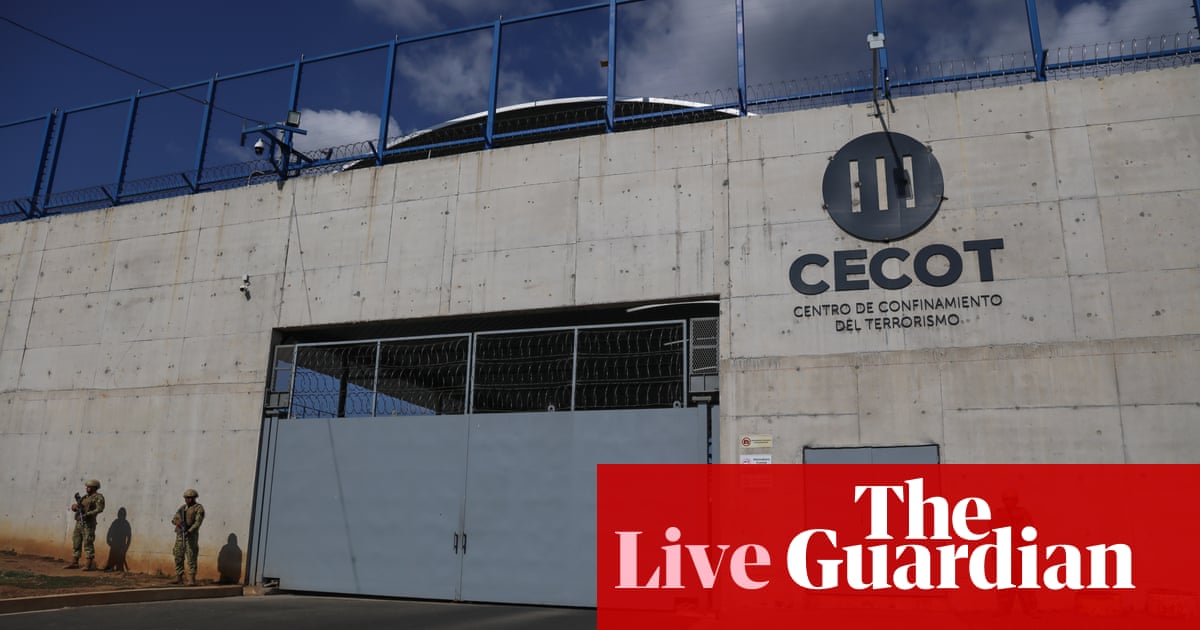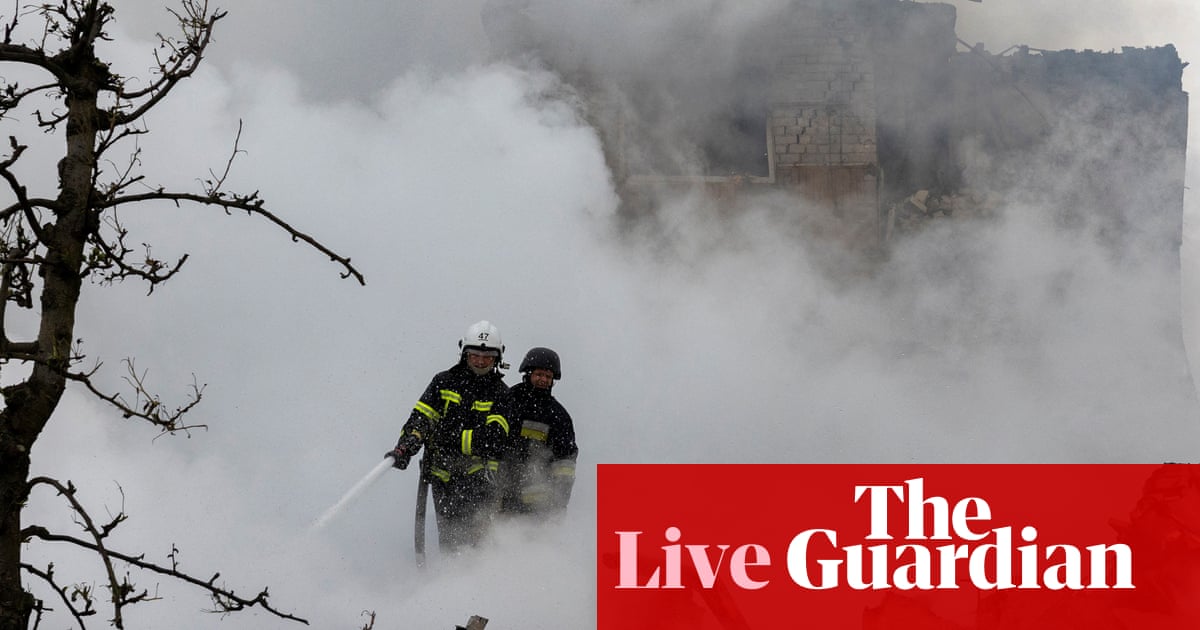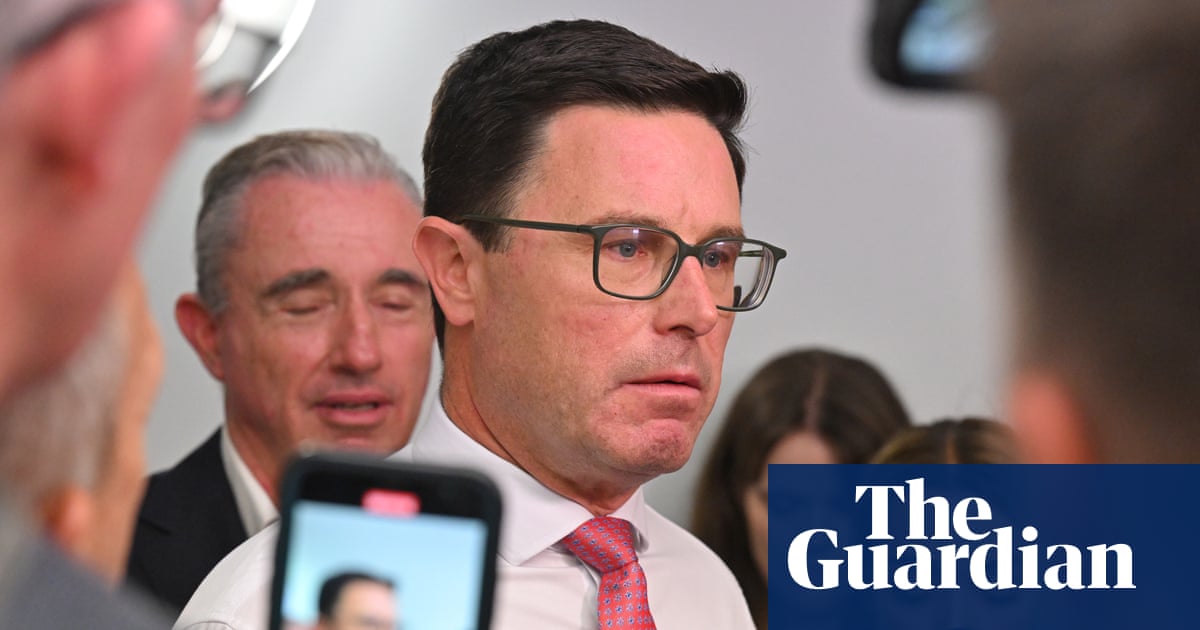Judge finds ‘probable cause’ to hold Trump administration in criminal contempt for violating order on Venezuelan deportations
US federal judge James Boasberg on Wednesday found “probable cause” to hold Donald Trump’s administration in contempt of court for violating his order last month halting deportations of Venezuelan migrants under the wartime Alien Enemies Act.
Boasberg gave the Department of Justice a one-week deadline to file “a declaration explaining the steps they have taken and will take to do so”.
Last month he instructed the Trump administration to explain why its failure to turn around flights carrying more than 200 deportees to El Salvador did not violate his court order.
Boasberg wrote in his ruling on Wednesday:
As this Opinion will detail, the Court ultimately determines that the Government’s actions on that day demonstrate a willful disregard for its Order, sufficient for the Court to conclude that probable cause exists to find the Government in criminal contempt.
The Court does not reach such conclusion lightly or hastily; indeed, it has given Defendants ample opportunity to rectify or explain their actions. None of their responses has been satisfactory.
I’ll bring you more on this as we get it.

Key events
As NPR notes, the supreme court weighed in on the case last week, saying the ACLU and Democracy Forward should have brought their suits in a different court, and under a different statute. But it didn’t rule on the underlying constitutionality of Trump’s invocation of the Alien Enemies Act, and also said any alleged gang members deported under the act need to be given notice of deportation and the opportunity to contest it.
“That Court’s later determination that the TRO suffered from a legal defect, however, does not excuse the Government’s violation,” Boasberg said about the supreme court’s order. “If a party chooses to disobey the order – rather than wait for it to be reversed through the judicial process – such disobedience is punishable as contempt, notwithstanding any later-revealed deficiencies in the order.”
ABC News has more extracts from Judge James Boasberg’s ruling, including that the administration’s “willful disobedience of judicial orders” without consequences would make “a solemn mockery” of “the Constitution itself”.
Boasberg has given the federal government until 23 April to respond to try to “purge their contempt” and prove they did not violate his temporary restraining order. Should they fail to answer his questions by then, he said, he will refer the matter for potential prosecution.
He said the “most obvious” way for the administration to avoid contempt would be to allow migrants deported under the law in violation of his order to challenge their removal in court. The judge said that would not require bringing the migrants back to the United States, adding that the administration could “propose other methods of coming into compliance”. He wrote:
The most obvious way for Defendants to do so here is by asserting custody of the individuals who were removed in violation of the Court’s classwide TRO so that they might avail themselves of their right to challenge their removability through a habeas proceeding.
Per the terms of the TRO, the Government would not need to release any of those individuals, nor would it need to transport them back to the homeland. The Court will also give Defendants an opportunity to propose other methods of coming into compliance, which the Court will evaluate.
Alternatively, if the Trump administration does not wish to purge Boasberg’s contempt finding, the government must provide the name of the person or people who chose not to stop the deportations out of the US despite his order – and Boasberg said he would refer them for prosecution. The judge said he will “proceed to identify the individual(s) responsible for the contumacious conduct by determining whose ‘specific act or omission’ caused the noncompliance”.
The judge said he will begin by requiring declarations from the government, and if those prove to be unsatisfactory, he will “proceed either to hearings with live witness testimony under oath or to depositions conducted by Plaintiffs”.
As a final potential step, Boasberg raised the prospect that he could appoint an independent attorney to prosecute the government for its contempt.
The next step would be for the Court, pursuant to the Federal Rules of Criminal Procedure, to request that the contempt be prosecuted by an attorney for the government.
If the government “declines” or “the interest of justice requires”, the court will “appoint another attorney to prosecute the contempt”, he wrote.
Judge finds ‘probable cause’ to hold Trump administration in criminal contempt for violating order on Venezuelan deportations
US federal judge James Boasberg on Wednesday found “probable cause” to hold Donald Trump’s administration in contempt of court for violating his order last month halting deportations of Venezuelan migrants under the wartime Alien Enemies Act.
Boasberg gave the Department of Justice a one-week deadline to file “a declaration explaining the steps they have taken and will take to do so”.
Last month he instructed the Trump administration to explain why its failure to turn around flights carrying more than 200 deportees to El Salvador did not violate his court order.
Boasberg wrote in his ruling on Wednesday:
As this Opinion will detail, the Court ultimately determines that the Government’s actions on that day demonstrate a willful disregard for its Order, sufficient for the Court to conclude that probable cause exists to find the Government in criminal contempt.
The Court does not reach such conclusion lightly or hastily; indeed, it has given Defendants ample opportunity to rectify or explain their actions. None of their responses has been satisfactory.
I’ll bring you more on this as we get it.
Senator Chris Van Hollen lands in El Salvador to find Maryland man illegally deported by Trump administration
Democratic senator Chris Van Hollen of Maryland is in El Salvador to get answers about the Trump administration’s illegal deportation of Kilmar Ábrego García. He said he hopes to meet Ábrego García in person and see his condition.
He said in a video posted on social media:
I just landed in San Salvador a little while ago, and I look forward to meeting with the team at the U.S. embassy to discuss the release of Mr. Abrego Garcia. I also hope to meet with Salvadoran officials and with Kilmar himself. He was illegally abducted and needs to come home.
The state department has confirmed that Ábrego García is being held in El Salvador’s notorious Cecot mega-prison. Despite the US supreme court last week saying the Trump administration must “facilitate” his return to the US, the president refuses to do so.
Speaking to the Guardian on Tuesday, Van Hollen warned that the case has tipped the US into a constitutional crisis. He told my colleague Chris Stein:
We were in the gray zone before this. But if the Trump administration continues to thumb its nose at the federal courts in this case we’re in, we’re clearly in constitutional crisis territory.
This is a Maryland man. His family’s in Maryland, and he’s been caught up in this absolutely outrageous situation where the Trump administration admitted in court that he was erroneously abducted from the United States and placed in this notorious prison in El Salvador in violation of all his due process rights.
Van Hollen said that the case of Ábrego García marks a turning point for the Trump administration because the president is refusing to follow an order from the nation’s highest court – something Democrats have long warned he will do.
What they have not overtly done previously is outright defy a court order. They’ve slow-walked court orders, they’ve tried to parse their words based on technicalities, they’ve not outright defied a court order. In my view, this now clearly crosses that line.
Attorney general Pam Bondi: mistakenly deported man ‘not coming back to our country’
The US attorney general, Pam Bondi, said 29-year old Kilmar Ábrego García, who the Trump administration wrongfully detained and sent to El Salvador, is “not coming back to our country”.
Speaking to reporters on Wednesday, Bondi said:
He is not coming back to our country. President [Nayib] Bukele said he was not sending him back. That’s the end of the story.
She went on to add:
If he wanted to send him back, we would give him a plane ride back. There was no situation ever where he was going to stay in this country. None, none.
Last week, the supreme court unanimously ruled and ordered the administration to “facilitate” the return of García, who was supposed to have been protected from deportation to El Salvador, regardless of whether he was part of the MS-13 gang – a claim that Bondi repeated today and which García’s family and attorneys staunchly refutes. García has no criminal record in the US, according to court documents. It’s also noteworthy that while members of the Trump administration continue to make the claim on television, the Department of Justice has not made the MS-13 accusation in court papers and has admitted the deportation was an error.
Nevertheless, Trump’s administration has wrangled over the semantics of the supreme court’s ruling, arguing that the order to “facilitate” García’s return only means that the US would need to provide a plane if El Salvador decides to return him.
Earlier this week, Bukele said he has no plans to return García, saying: “The question is preposterous…. How can I smuggle a terrorist into the United States? I’m not going to do it.”
An independent expert will review security measures at Pennsylvania governor Josh Shapiro’s official residence after authorities said a man scaled an iron security fence and broke into Shapiro’s home on early Sunday.
According to state police, the review will be a risk and vulnerability assessment after the security breach as well as arson attack which left much of the governor’s residence damaged, Reuters reports.
On Monday, the suspect, Cody Balmer, denied having any mental illness and described himself as an unemployed welder with no income or savings. According to Balmer, he planned to beat Shapiro with a sledgehammer.

Stephen Starr
When FBI and Department of Homeland Security (DHS) agents descended recently on two homes owned by Xiaofeng Wang, a Chinese national and cybersecurity professor at Indiana University, many in the idyllic college town of Bloomington were shocked.
In December, Wang had been questioned by his employers about allegedly receiving undisclosed funding from China on a project that also received US federal research grants. On the same day of the home raids, Wang was fired from his longstanding post at Indiana University over email – a move that goes against the university’s own policy.
But Wang hasn’t been charged with any offence, and his lawyer says no criminal charges are pending.
The incident has driven fear into the hearts of Bloomington’s Asian community of faculty and students who fear a political motivation.
“I study at the computer science department, and I’ve overheard Chinese professors talking about how worried they are that something similar could happen them, too,” says a Chinese PhD student who came to Bloomington from Suzhou, Jiangsu province, last September and who asked not to be named given the sensitivity of the issue.
For the full story, click here:
US judge blocks energy department from slashing federal research funding
A federal judge temporarily blocked the Trump administration from carrying out steep cuts to federal research funding provided to universities by the US Department of Energy.
US district judge Allison Burroughs in Boston issued a temporary restraining order blocking the department from implementing the new policy at the behest of a group of universities including Massachusetts Institute of Technology, Princeton University and California Institute of Technology.
The judge said she would consider whether to issue a longer-term preliminary injunction during a 28 April hearing. The energy department did not immediately respond to a Reuters request for comment.
They along with several other universities and academic trade associations had sued on Monday to block the administration from moving forward with a policy change meant to reduce government spending in support of “indirect” research costs, which are not readily attributable to specific projects.
Indirect costs are often used to fund facilities, equipment and research staff that provide value across multiple research projects, rather than being tied to a single project.
The energy department announced on Friday that it would cut more than $400m in annual spending by setting an across-the-board 15% reimbursement rate for indirect costs of research. The department said the policy would bring “greater transparency and efficiency” to federal government spending.
The universities argued in their lawsuit that arbitrary cuts to indirect research costs would force them to lay off staff, shutter expensive facilities and devastate the careers of young scientists.
The plaintiffs include three trade associations including the Association of American Universities as well as Brown University, Cornell University, the University of Illinois, the University of Michigan, Michigan State University and the University of Rochester.
Associated Press accuses Trump administration of defying court order restoring its access to White House press events
The Associated Press accused aides to Donald Trump of defying a court order restoring its access to press events in the White House after a judge found the news agency had faced unlawful retaliation.
In a court filing on Wednesday, lawyers for the AP accused the White House of continuing to exclude its journalists from the small pool of reporters that travels with the president and attends events in the Oval Office in violation of US district judge Trevor McFadden’s order lifting those restrictions while a lawsuit moves forward.
McFadden found the White House had discriminated against the AP for continuing to refer to the Gulf of Mexico in its coverage rather than the Gulf of America as ordered by Trump. The court said the White House had probably violated free speech protections under the US constitution and ordered the White House to restore full access to the Associated Press to presidential events.
The White House has appealed McFadden’s ruling to a federal appeals court, which is set to hear arguments on Thursday.
The White House said on Tuesday all wire services, including Reuters and Bloomberg, would no longer hold a permanent spot in the press pool. The AP argued the new policy was in clear violation of the prior order and was a pretext for further retaliation against the AP.
Reuters and the AP both issued statements denouncing the new policy, which puts wire services in a larger rotation with about 30 other newspaper and print outlets.
Other media customers, including local news organizations that have no presence in Washington, rely on the wire services’ real-time reports of presidential statements as do global financial markets.
The AP says in its stylebook that the Gulf of Mexico has carried that name for more than 400 years and, as a global news agency, the AP will refer to it by its original name while acknowledging the new name Trump has chosen.
White House envoy Steve Witkoff and secretary of state Marco Rubio will visit France soon, French government spokesperson Sophie Primas told reporters.
Primas said they would broadly discuss issues in the Middle East with French officials, saying: “All subjects regarding the Middle East will be on the table.”
A French diplomatic source told Reuters Rubio would meet with his French counterpart, Jean-Noël Barrot, on Thursday during his visit to Paris, where they would discuss the war in Ukraine, the situation in the Middle East and the Iran nuclear talks.
Vice-President JD Vance will visit Italy and India from 18 to 24 April, the White House said on Wednesday, adding that he will discuss “shared economic and geopolitical priorities with leaders in each country”.
Vance is expected to meet with Italian prime minister Giorgia Meloni in Rome and with Vatican secretary of state Cardinal Pietro Parolin. In India, he is set to meet prime minister Narendra Modi and visit New Delhi, Jaipur and Agra.
Harvard’s stand against the Trump administration appears to have rallied other universities, after the likes of Barack Obama and Yale yesterday threw their support behind the Ivy League school’s rejection of an attempt at “government regulation”.
KTVU reports that Stanford said it supports Harvard after the university announced that it will not eliminate its DEI initiatives, though officials stopped short of saying how they plan to respond to demands to eliminate DEI by the Trump administration. Stanford’s president Jonathan Levin and provost Jenny Martinez said in a joint statement:
America’s universities are a source of great national strength, creating knowledge and driving innovation and economic growth. This strength has been built on government investment but not government control. The Supreme Court recognized this years ago when it articulated the essential freedoms of universities under the First Amendment as the ability to determine who gets to teach, what is taught, how it is taught, and who is admitted to study.
Universities need to address legitimate criticisms with humility and openness. But the way to bring about constructive change is not by destroying the nation’s capacity for scientific research, or through the government taking command of a private institution. Harvard’s objections to the letter it received are rooted in the American tradition of liberty, a tradition essential to our country’s universities, and worth defending.
Columbia, which caved to demands by the Trump administration as a pre-condition for restoring $400m in grants, has vowed to reject any deal that erodes its independence, the New York Times (paywall) reports. The university’s acting president said talks were continuing as the White House is seeking to place the university under judicial oversight.
Yesterday we reported that faculty at Yale University asked its leadership “to resist and legally challenge any unlawful demands that threaten academic freedom and … self-governance”, while a statement from former president Obama read:
Harvard has set an example for other higher-ed institutions – rejecting an unlawful and ham-handed attempt to stifle academic freedom, while taking concrete steps to make sure all students at Harvard can benefit from an environment of intellectual inquiry, rigorous debate and mutual respect. Let’s hope other institutions follow suit.
Announcing the Trump administration’s civil lawsuit against the Maine department of education, US attorney general Pam Bondi said women were being discriminated against in sports. “This is about sports, but this is also about women’s safety,” she said.
The state of Maine is discriminating against women by failing to protect women in women’s sports. Pretty basic stuff.
Bondi said the administration is also looking at “Minnesota, California, we’re looking at many, many states, but they’re the top two that should be on notice, because we have been communicating with them”.










